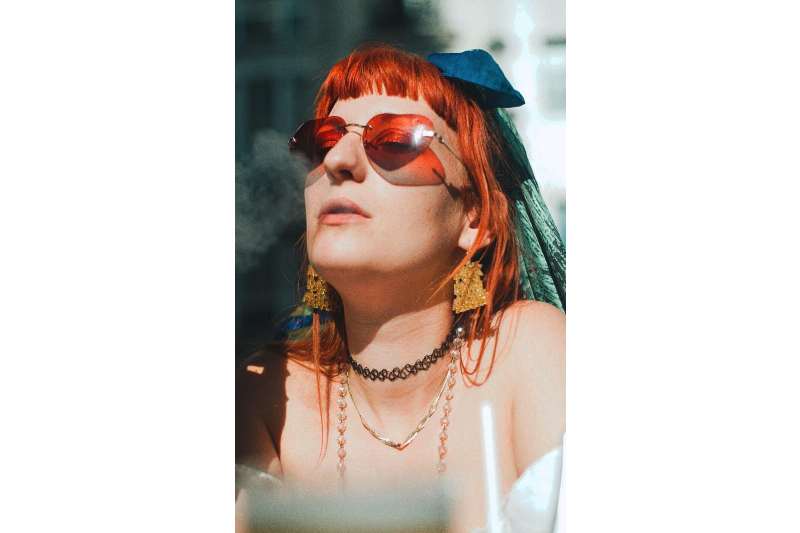Image credit: Diana Vos
Tell us about who you are? What motivates you? What inspires you? How do you see current Brussels LGBTQI+ scene? (What’s good, what can be improved, what does Brussels miss)
I’m Lyne, I’ve been living in Brussels for nearly ten years. After studying in the cultural sector, both as creator and curator, I’ve had a wide range of job titles, from trainer to educator, from events manager to musician manager. I’ve also started different projects with the LGBTQIA+ communities, in the feminist sector, in the music sector, and a combination of all three!
From a grassroots perspective, The current scene is blooming Our context is an unprecedented one: we went from being overly discriminated against, living in hiding, to our identities being overwhelmingly “tolerated” (for the most privileged of us), to then being the centre of a myriad of “rainbow-washing” and institutionalisation of our communities. All in the last 50 years, all while the most marginalised people within the acronym were further marginalised, not only by the outside world but also by our own.
Some people see this “fragmentation” of our communities as a new and bad thing. I see it as not only a historic reality, also as a necessary and wonderful thing. Brussels allows for more and more collectives to represent, give space and agency to every single human being. For example, Let’s Talk About Non-Binary, Les Peaux de Minuit, Merhaba, Naast Monique, all these organisations are created by and targeted at specific communities, with a diverse level of “formalisation”. This diversity is essential to fostering a wider and more understanding LGBTQIA+ community.
As for what is lacking, I’d love to see more initiatives focused on bi/pan+ folks. There are currently nonactive: having organised Bi Visibility Day back in 2021, I could not only see the importance it had, I was also able to gauge the overall relationship to the rest of the communities. When you look at the numbers, we are usually the most under-represented and invisible group, even if we are statistically the biggest in numbers and in percentage of people at risk. So, I’d love to see more actions and collectives active by and for bi/pan+ folks! If you’re interested, hit me up
You are a proud and vocal activist for women’s and queer rights – what is your take on current sudden aggressive rhetoric towards women, trans and non-binary people? How do we combat it? What can each one of us do every day to, slowly but surely, eradicate inequalities, hate speech, harassment, discrimination, and violence?
This “sudden” aggressive rhetoric is sadly not a surprise. Susan Faludi’s 1991 “Backlash” lays out the first theory around the aggressive moment that follows after a moment of so-called “liberation” of FINTA people (FINTA people = Fæmme, Intersex people, Non-binary people, Transgender people, Agender people). In simpler terms, the dominant groups give us the illusion of being heard, and when they have pretended enough to care about our demands, always from a surface level, we are asked to go back to the kitchen. Jokes aside, these consequences can be dire, from policies being reversed to the premature death of several of our siblings, especially transgender and non-binary folks. And this cycle sadly repeats every time.
After the #MeToo movement’s peak in 2017, we are now experiencing the backlash of it. As our societies are shifting towards accepting the existence of people other than cis-white-men, the most marginalised of us are then starting to freely exist publicly and/or privately. The thing is, having feminist platforms that question gender norms as a whole has another “unexpected” result, which is the emancipation from all gender norms, either wished for everyone or actively practised by some folks.
Refusing to conform to the systems of cis-hetero-patriarchal-monogamous-white-capitalist-valid ideologies creates systemic waves of discrimination and pushback. And when you have systemic problems, you need systemic solutions. Aka, we need to have a look at problems as they arise in their unique contexts and place in the system. Each has specific power dynamics, specific groups targeted, specific actors with various responsibilities and power, and specific steps needed to be solved on a short term and/or on a long term.
That means there is no easy fix and that we are not equal in our responsibilities and our power to solve these systemic discriminations and inequalities. For example, if you’re in a position of power anywhere (school, work, politics, friends group, social class, race, etc.) it would be your responsibility to use your power to solve one part of a “problem”, either short term or long term, whether it be one specific element or group of elements. But you alone will never be able to solve everything everywhere all at once. We can start by ourselves, and we need everyone involved.
Identifying where you stand in the face of systemic discrimination (aka oppression) will help you to identify what you can do and to find communities around you that can support and uplift you while you do it.
For me, keeping this systemic vision helps me identify what I can or should do and to identify what others who have power can or should do. It also helps me to not be too overwhelmed as an activist, especially regarding my mental health and boundaries. So, I hope my short analysis can help guide some of you into this complex world!
If you want a more practical answer, give your money and/or time (if you have it) to support FINTA creators, online or in person. I cater an online agenda What’s Up Brussels with events by and/or for FINTA people in the cultural sector, so if you’re looking for inspiration, you can always start there. And if you have anything that is not on there just hit me up and I’ll add it!
-> So go to their shows, give them your money, your time, discover artists, people, and places, and let’s give each other the agency we deserve in order to shine.
Who are Brussels artists or artistic collectives that inspire you? How would you describe your (musical) style? How did you get into music? You are collaborating with a plethora of different artists and collectives from Lou K to women from Radio Vacarme – tell us about these collaborations? Where do you find new sounds?
I grew up listening to music with my dad: there was always music playing in our home, CDs laying around for me and my sister to browse through, and conversations about music to be had. Anything from Pink Floyd, ZZ Top, to Kate Bush and Nina Hagen.
Then, as an adult, my first encounter with the music sector was completely unplanned: I met musicians in a bar who invited me to attend their jam session. And that’s where my big relationship with music entered a new level. I went from admirer of music to supporter to manager to promoter and so on.
I started by managing musicians, supporting them in developing their projects.
Then I really became aware of the lack of FINTA people in jam sessions, so in 2019 I took it upon myself to start the Femme Jam, in collaboration with The Crazy Circle. It is/was a stage in chosen-mixity as a tool for musical expression, experimentation, networking, and most of all enjoyment.
As the years went by, and the discriminations kept piling up, I stopped working with cis men all together and focused completely on FINTA artists and collectives. That’s when I met Les Volumineuses, Rebel, Poxcat, Psst Mlle, Missfitte, and so many more inspiring people fostering a safer and more representative music scene.
On the institutional level, the development of SCIVIAS is also a big sign of the mainstream scene evolving. I’ve been outspokenly defending FINTA people and have been invited in several juries. I’ve even ran a conference on “Building Better spaces for FINTA people in the music sector” at the latest ELC [EuroCentral-Asian Lesbian Community] Conference in Budapest.
I speak out/up when needed on news and projects around FINTA people in the music sector and I go to many conferences and professional meet-ups – that is usually where I find new collaborators, new sounds, etc.
When it comes to music genres, I don’t really have a preferred style of music. I do have a soft spot for rock and live bands, but my playlists are all over the place. I love discovering new FINTA artists, and new FINTA people who are making the music sector run smoothly. That is what drove me to start my show She They Sounds on Radio Vacarme, because I get to shine a light on these incredible people, and everyone can meet them and discover their amazing work.
Collaborating with artists directly is something I’ve done in the past, with great bands such as Astrid B. or Lou K. I’ve had the pleasure to be trusted with the development of a part of their projects, and the experience I gained with them was immensely valuable. This kind of trust was also given to me by the other FINTA people I’ve had the pleasure to work with or even just to meet in the music sector. I thank them very much for sharing their experiences and their wishes for the sector. As I’m one of the people lucky enough to have a platform, I’m proud to be using it to advocate and build a better music sector for FINTA people.
What should we be expecting from you in the future (next 6 months – year)?
On the music side, I continue to focus on my radio show She They Sounds – many exciting guests to come for the next part of season 2! I’m also looking to expand my work within the music sector, but I can’t say too much right now. More to be announced in the coming months!
I’m still looking for opportunities to support anyone who wants to develop a safer and a more representative work environment, whether in the music sector or in the general cultural and activist sector overall.
On the events side, save the date for May 18th! With my radio show She They Sounds I’m inviting my dear friend from A L’Aise, Bien to host a party together at Brasserie Illegaal on Thursday May 18th for Pride Week! A FINTA-LBQP+ party not to miss! The venue has a courtyard with a petanque field, plenty of sun, good non-alcoholic and alcoholic options, and the hottest DJs to make us dance all night long!
What do you love most about Brussels?
It is hard to choose haha!
I’d say it is the fertile ground it provides for initiatives to grow, the comfortable setting it allows for people to meet and to connect, its diversity and constant growth, all while remaining a human-scaled village.
Brussels is the unexpectedly cool city that takes your breath away just by being herself, and therefore allowing you to be yours, too!
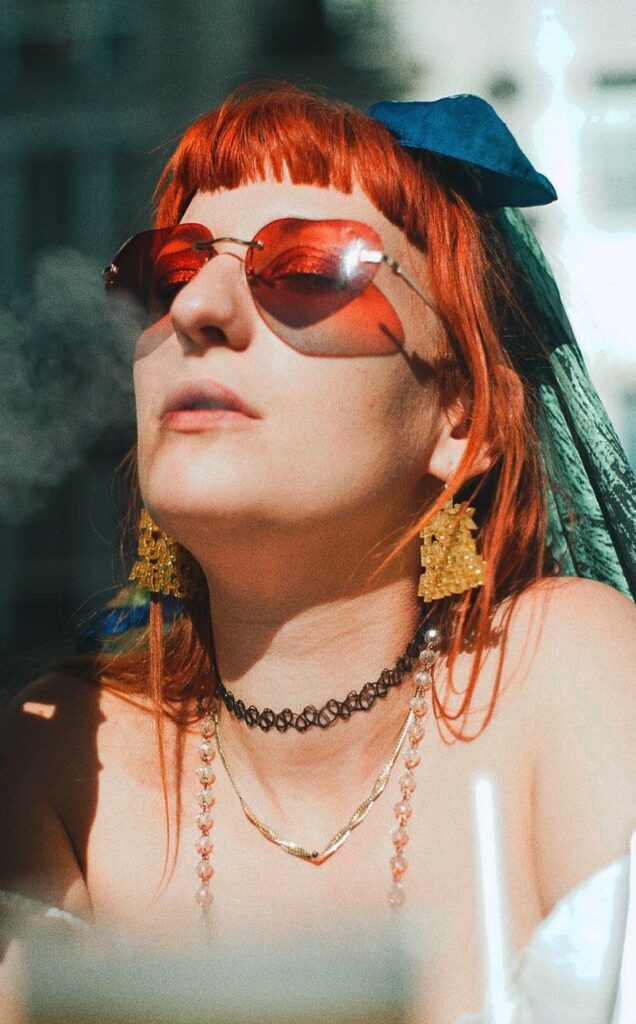
You may also like
-

Why Staying in Brussels in July Is Absolutely Brilliant
In partnership with Visit.brussels If you think summer in Brussels means empty streets and closed
-
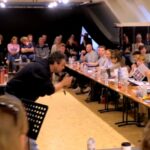
Two Sensational New Musicals Set to Shine at Bruxellons Festival
This summer, the Bruxellons Festival is gearing up to present two extraordinary musical premieres, each
-
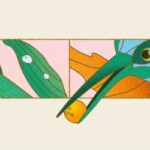
Paradise City Celebrates Its 10th Anniversary: An Exceptional Edition in 2025
From June 27 to 29, 2025, Paradise City Festival will celebrate its 10th edition in
-
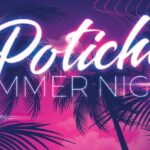
Potiche Launches Summer Mode: A Season of Dazzling Nights in Brussels
As the summer sun rises over Brussels, Potiche is turning up the heat with its
-
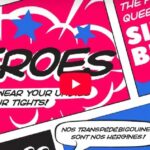
Sing Out Brussels! Releases Vibrant New Concert Video Celebrating Diversity and Pride
Sing Out Brussels! (The Fabulous Queer Choir) has just released its latest concert video, recorded

